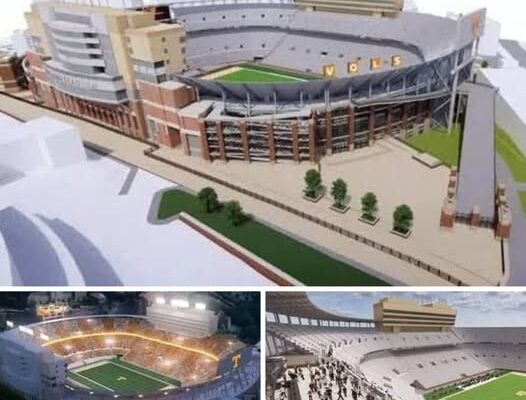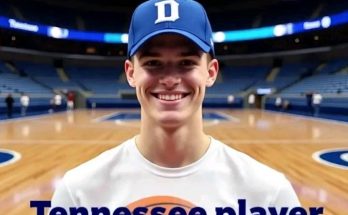Despite some excitement online about a “$1 billion” overhaul, publicly released documents and trusted reporting show the University of Tennessee has allocated:
- Phase 1 budget: $337 million
- Initially approved in 2017 at ~$180 million
- Scope and costs rose via a $108 million revision in June 2022, followed by a $49 million top-up in June 2023
- Now stands firmly at $337 million
- Funding method:
- Entirely covered through donor gifts, stadium-generated revenues, and state-allocated public funds
- No tuition increase nor student tuition revenue supports it
So far, there’s no evidence of a full-billion-dollar spend. That figure almost certainly conflates the Phase 1 cost with speculative future expenditures—such as the proposed entertainment district, hotels, condos, etc.—which are likely outside this initial budget.
This renovation follows a seasonal delivery model—revealing new improvements each fall through 2026.
- Demolition of South Stadium Hall and structural enhancements to the south end
- Partial rollout of Wi‑Fi infrastructure
- Brick cladding around in‑bowl vomitories adds a touch of cohesive architecture
- Built new restrooms under Gate 10 ramp
- Full stadium‑wide Wi‑Fi for seamless connectivity
- Built new kitchen, commissary, loading dock—boosting back‑of‑house efficiency
- Installed southeast elevators linking concoursesLaid out a new Gate 4 entry plaza
- Added skybox renovations and started work on Founders Suites
- Added restrooms and concessions on the north concourse
- South concourse widened, with extra restrooms and more concessions
- Founders Suites construction completes
- Tee Martin Drive is relocated below Gate 10 ramp
- Entry plazas finalized across various gates
Each phase builds upon the last—gradually transforming key parts of the stadium and boosting fan satisfaction steadily over four years.
Below is a breakdown of what’s been delivered—and what’s coming—in this comprehensive first phase.
- Wi‑Fi: From partial in 2023 to full in 2024, ensuring real-time stats, ticket scanning, and livestream access
- Elevators: Core vertical mobility system enhances accessibility for all fans
- Brick cladding: Aligns stadium aesthetics with campus architecture (utsports.com)
- Lower West Club: ~12,000 sq ft indoor air-conditioned space with upscale concessions and private restrooms; already fully booked (utsports.com)
- Founders Suites (Upper North): Premium suites with lounge-style decor, multi‑screen TVs, and a bar—great for donors and VIPs )
- Skybox upgrades: Enhanced common areas and operable windows to bring in fresh air
- Concourse expansion: South concourse widened (36 ft vs ~12 ft previously), reducing bottlenecks
- Restrooms & concessions: Dramatically increased availability to cut down on wait times
- New Gate Plazas: Designed to ease arrival/departure gridlock
- Historic V-O-L-S letters return—LED panels align with campus style
- Brick cladding extensions dry up mismatched concrete and blend into the broader UT brand
- r (utsports.com)
- Sound system has been overhauled to improve clarity, volume, and intelligibility
Phase 1 also revamps the culinary landscape—from grab-and-go stands to craft beer and novelty items:
- Grab-and-go markets with over 100 new POS terminals
- Expanded menu options:
- Pimento-cheese hot dogs
- Pulled buffalo chicken sandwiches
- Korean BBQ and Checkerboard Cheese grilled cheese
- Vol Lager craft beer and Ole Smoky moonshine
- Commemorative items: collectible tickets and trading cards via vending machines
More price range options—both quick bites and premium indulgences—are enhancing the game day experience.
In August 2024, Tennessee Athletics announced a long-term (potentially 20+ years) sponsorship with Pilot Travel Centers:
- Pilot becomes presenting partner of the renovation, keeping “Neyland Stadium” and “Shields–Watkins Field” names unchanged
- Naming rights remain untapped; most field décor is promotional rather than renaming
- Fund allocation from Pilot helps finance amenities without lowering fan ticket access )
This model—corporate funding with preserved tradition—appears to be a core pillar of this renovation.
Parallel planning is underway for a mixed-use Entertainment District wrapping around Neyland Stadium:
- Features include: boutique hotel, riverfront condos, retail spaces, rooftop dining, conference center, pool terraces, and elevated tailgating decks
- Goal: connect campus to the Tennessee River, create year-round revenue, and emulate the success of MBS’s “Battery” model
- Status: Approved for Request for Proposals (RFP); concept renderings released; commercial planning in progress
While this entertainment district isn’t formally part of the current $337 M budget, its long-term impact on campus vibrancy is significant.
- Despite slight reductions for increased space, fan comfort has improved without compromising size
- Student and alumni season tickets (~70,500) consistently sell out
- Nebraska series cancellation tied partly to capacity reductions during renovations
Neyland is a century-plus landmark. These upgrades weave modern amenities back into the fabric without diluting its iconic character
Expanded concourses, upgraded elevators, and more amenities reduce bottlenecks and increase inclusivity.
Premium experiences (clubs, suites) fund everyday fan benefits—an effective, non-tax burden model .
The entertainment district envisions a campus hub that’s active year-round, blending athletics with local commerce and tourism.
- SEC peer stadiums: Florida ($400 M), Georgia ($350 M), Texas A&M ($250 M); UT’s project is par for the course (frontofficesports.com)
- NFL example: Tennessee Titans’ new $2.1 B domed stadium (2027), comparing public vs. private funding tradeoffs (en.wikipedia.org)
- Recommendations: UT adopts a hybrid model—blending private donor and corporate sponsorship (like Pilot), avoiding full reliance on public funds or student fees.
Looking ahead:
- Phase 2+: May include further concourse upgrades, more premium spaces, enhanced exterior infrastructure—possibly funded by new revenue from the entertainment district
- Campus expansion: Hotel, retail, tailgating decks, riverside access
- Funding streams: On-field sponsorships, real estate development, paid premium seating—all leaning into non-tuition revenue
This seems to form a master-planned renewal stretching into the next decade.
| Campus Impact | Major upgrade aligned with campus architecture and long-term vision |
- The figure “$1 billion” is an exaggeration—Phase 1 costs $337 million, with further spending possible
- Phase 1 upgrades (2023–2026) are already transforming comfort, connectivity, and hospitality
- The entertainment district—still in early planning—could eventually elevate the entire precinct
- Financing leans on premium revenue, corporate sponsorship, and student-free public funds
- This isn’t just a renovation—it’s a strategic elevation of Neyland Stadium and the campus
If you’d like, I can drill down deeper into specific areas—premium offerings, food and beverage upgrades, or what the fan experience looks like on game day. Just say which part you want more insight on!



